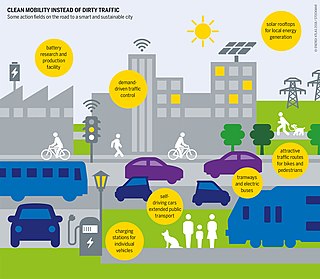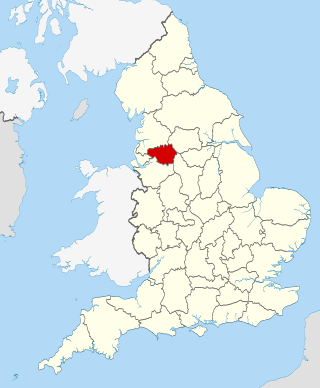Related Research Articles

Cycling, also known as bicycling or biking, is the activity of riding a bicycle or other type of cycle. It encompasses the use of human-powered vehicles such as balance bikes, unicycles, tricycles, and quadricycles. Cycling is practised around the world for purposes including transport, recreation, exercise, and competitive sport.

The mayor of London is the chief executive of the Greater London Authority. The role was created in 2000 after the Greater London devolution referendum in 1998, and was the first directly elected mayor in the United Kingdom.

Utility cycling encompasses any cycling done simply as a means of transport rather than as a sport or leisure activity. It is the original and most common type of cycling in the world. Cycling mobility is one of the various types of private transport and a major part of individual mobility.

Sustrans is a United Kingdom-based walking, wheeling and cycling charity, and the custodian of the National Cycle Network.
National Highways (NH), formerly the Highways Agency and later Highways England, is a government-owned company charged with operating, maintaining and improving motorways and major A roads in England. It also sets highways standards used by all four UK administrations, through the Design Manual for Roads and Bridges. Within England, it operates information services through the provision of on-road signage and its Traffic England website, provides traffic officers to deal with incidents on its network, and manages the delivery of improvement schemes to the network.

Sustainable transport refers to ways of transportation that are sustainable in terms of their social and environmental impacts. Components for evaluating sustainability include the particular vehicles used for road, water or air transport; the source of energy; and the infrastructure used to accommodate the transport. Transport operations and logistics as well as transit-oriented development are also involved in evaluation. Transportation sustainability is largely being measured by transportation system effectiveness and efficiency as well as the environmental and climate impacts of the system. Transport systems have significant impacts on the environment, accounting for between 20% and 25% of world energy consumption and carbon dioxide emissions. The majority of the emissions, almost 97%, came from direct burning of fossil fuels. In 2019, about 95% of the fuel came from fossil sources. The main source of greenhouse gas emissions in the European Union is transportation. In 2019 it contributes to about 31% of global emissions and 24% of emissions in the EU. In addition, up to the COVID-19 pandemic, emissions have only increased in this one sector. Greenhouse gas emissions from transport are increasing at a faster rate than any other energy using sector. Road transport is also a major contributor to local air pollution and smog.

Transport for Greater Manchester (TfGM) is a local government body responsible for co-ordinating transport services throughout Greater Manchester in North West England. It is an executive arm of the Greater Manchester Combined Authority (GMCA), the city region's administrative authority. The strategies and policies of Transport for Greater Manchester are set by the GMCA and its Greater Manchester Transport Committee (GMTC). The committee is made up of 33 councillors appointed from the ten Greater Manchester boroughs, as well as the Mayor of Greater Manchester.

England has a dense, multimodal transportation infrastructure. The Department for Transport is the government department responsible for the transport network in England. The Secretary of State for Transport is the member of the cabinet responsible to Parliament for the Department for Transport.

The Transport Direct Programme was a division of the UK Department for Transport (DfT) to develop standards, data and better information technology systems to support public transport. It developed and operates the Transport Direct Portal which is a public facing multi-modal journey planner. It also supports the creation and management of comprehensive databases of all public transport movements in the United Kingdom with Traveline. During 2010 two key datasets were released as Open Data and published on www.data.gov.uk.

USA Cycling or USAC, based in Colorado Springs, Colorado, is the national governing body for bicycle racing in the United States. It covers the disciplines of road, track, mountain bike, cyclo-cross, and BMX across all ages and ability levels. In 2015, USAC had a membership of 61,631 individual members.
Bikeability is the Department for Transport’s national award provider for cycle training in England. Primarily for children and young people, it is a progressive programme where riders will first master cycle handling skills in motor-traffic-free environments, then develop their skills and confidence to cycle on single-lane roads and simple junctions with mostly moderate motor traffic flows, before tackling busier/ or faster roads, and complex junctions . After completing the training, Bikeability cyclists receive a booklet, a badge and a certificate to recognise training completion. The certificate also identifies areas for further practice as noted by the instructor.

The Concessionary Bus Travel Act 2007 is an Act of the Parliament of the United Kingdom which entitles all people resident in England who are either disabled or over the age of 60 to free travel on local buses at off-peak times anywhere within England ; previously, free travel had only been available within the recipient's local authority area.

The Street Trust is a 501(c)(3) non-profit advocacy organization based in Portland, Oregon, United States. The Street Trust advocates for the safety and ease of biking, walking and riding public transit in communities. The organization does legislative work at the statewide and national levels and endorses legislation and ballot measures. It successfully lobbied Portland's mass transit company, TriMet, to accommodate bicycles on buses and prevailed in a lawsuit to uphold Oregon's Bicycle Bill.

Cycling in Sydney, New South Wales, Australia takes place for recreation, commuting and as a sport. Sydney has a hilly topography and so may require a slightly higher level of fitness from cyclists than flatter cities such as Melbourne and Canberra. Sydney depends heavily on motor vehicles where traffic and public transport operate at capacity. This means that cyclist are often competing with motorists for limited space on busier roads, and for limited government resources for expenditure on road infrastructure. In its favour, Sydney has a generally mild climate and there are active cycling groups.

Cycling in New Zealand is the 5th most popular form of active recreation, but a very marginal commuting mode, with the share hovering around 1–3% in most major cities. This is due to a number of factors, principally safety fears.

Active mobility, soft mobility, active travel, active transport or active transportation is the transport of people or goods, through non-motorized means, based around human physical activity. The best-known forms of active mobility are walking and cycling, though other modes include running, rowing, skateboarding, kick scooters and roller skates. Due to its prevalence, cycling is sometimes considered separately from the other forms of active mobility.

Cycling in Cardiff, capital of Wales, is facilitated by its easy gradients and large parks. In the mid-2000s between 2.7% and 4.3% of people commuted to work by cycling in the city. In 2017 12.4% of workers cycled to work at least 5 days a week. However, cyclists in the city are deterred from cycling by poor facilities and aggressive traffic, according to research by Cardiff University.

The Institute for Transportation and Development Policy (ITDP) is a non-governmental non-profit organization that focuses on developing bus rapid transit (BRT) systems, promoting biking, walking, and non-motorized transport, and improving private bus operators margins. Other programs include parking reform, traffic demand management, and global climate and transport policy. According to its mission statement, ITDP is committed to "promoting sustainable and equitable transportation worldwide."

Cycling in Auckland is a mode of transport which has historically had high levels of modal share in Auckland, New Zealand, like in most cities in New Zealand. However, the dominance of the car in the city, the negative attitudes of car drivers and general changes in transport patterns had made it a very marginal transport mode in the early 21st century, with remaining cyclists often riding for leisure and sports purposes.

Cycling in the United Kingdom has a long history, since the earliest days of the bicycle, and after a decline in the mid-20th century has been undergoing a resurgence in recent decades.
References
- 1 2 Cycling England Archived 6 May 2011 at the Wayback Machine on Department of Transport Website. Retrieved 2 May 2011.
- ↑ "Cycling". Department for Transport. Retrieved 23 September 2010.
The Department set up Cycling England in March 2005 to coordinate increases in cycling across the country.
- ↑ "Establishment". Archived from the original on 7 July 2011. Retrieved 14 October 2010.
A new national body to plan and co-ordinate the development of cycling across the country and a new National Standard for Cycle Training was announced today by the Minister for Local Transport, Charlotte Atkins. The new national body, Cycling England, will have a budget of at least £5m a year for the next three years to allocate to cycling programmes. Cycling England will change the way that the Government manages and delivers cycling policy to get better value from cycling investment
- ↑ "Mid term review" (PDF). Archived from the original (PDF) on 23 May 2011. Retrieved 14 October 2010.
- ↑ "PUBLIC BODIES REFORM – PROPOSALS FOR CHANGE" (PDF). 14 October 2010. Archived from the original (PDF) on 12 January 2012. Retrieved 25 September 2010.
No longer an NDPB - Abolish body. We have announced a Local Sustainable Travel Fund and will explore ways of marshalling expert input on cycling issues, including to support the Fund
- ↑ "Norman Baker details plans for Local Sustainable Travel Fund". PublicSectorTravel. Archived from the original on 27 September 2010. Retrieved 14 October 2010.
Local Transport Minister Norman Baker is launching a Local Sustainable Travel Fund to support measures to encourage economic growth and reduce carbon emissions. The Fund will be financed from within the Department's overall budget allocation following the Spending Review.
- ↑ "Cycling City, Cycling Towns". Cycling England. Archived from the original on 19 May 2009. Retrieved 27 March 2010.
- 1 2 "Bikeability". cycling England. Archived from the original on 3 December 2009. Retrieved 27 March 2010.
- ↑ "Journey Planner". Archived from the original on 14 June 2010. Retrieved 27 March 2010.
- ↑ "Our Board". Department for Transport. Archived from the original on 30 January 2011. Retrieved 27 March 2010.